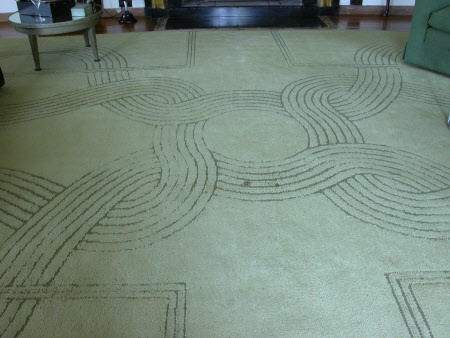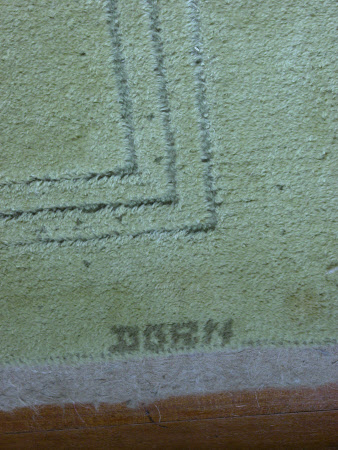Carpet
Marion Victoria Dorn (1899-1964)
Category
Carpets, rugs and mats
Date
Unknown
Materials
Order this imageCollection
Coleton Fishacre, Devon
NT 1502509
Caption
Marion Dorn trained at Stanford University, California, and moved to London in 1923. She quickly became recognised as one of the leading modern textile designers in Britain. Dorn is best known for her luxuriously textured, hand-knotted ‘sculpted’ rugs and carpets, many of which were produced with the Wilton Royal Carpet Factory. By the 1930s Dorn had produced over 100 mostly abstract designs for Wilton. Each was marketed as a limited-edition work of art, leading to her being described in a 1932 article in The Architectural Review as ‘the architect of floors’. In addition to working with manufacturers and exhibiting her work alongside other artists, Dorn received many important private commissions through her design consultancy. She created carpets and textiles for modern, fashionable interiors at Eltham Palace, as well as for the Cunard White Star cruise line. Rupert D’Oyly Carte was Chair of the Savoy Group, his family company, and commissioned extensive ranges of carpets and rugs from Dorn for the Savoy, Berkeley and Claridge’s hotels. The pieces by Dorn at Coleton Fishacre in Devon are among very few original furnishings owned by the D’Oyly Cartes still remaining at his country house. Dorn also collaborated with architects and designers to produce innovative interior schemes, including a carpet for the critically acclaimed ‘all white’ room created by Syrie Maugham (1879–1955) at her home in Chelsea. In 1937 Dorn was commissioned to produce seating upholstery designs for the London Passenger Transport Board. Dorn returned to the USA in 1940 and continued to work privately and with manufacturers. One major project, in 1960, was the production of carpets for the Diplomatic Reception Room at the White House, Washington DC. In 1957, in recognition of her outstanding contribution to textile design, Dorn was awarded an honorary fellowship of the British Society of Industrial Artists. As well as her sculpted carpets, Dorn designed theatre costumes and sets, wall hangings and wallpaper, embroidery, furnishing fabric and scarves.
Summary
Pale green carpeting designed by Marion Dorn in four pieces; main carpet, two mats and a stair runner. Pattern is a geometric design of swirls and squares
Makers and roles
Marion Victoria Dorn (1899-1964), designer
References
Conroy, Rachel, Women Artists and Designers at the National Trust, 2025, pp. 196-199

